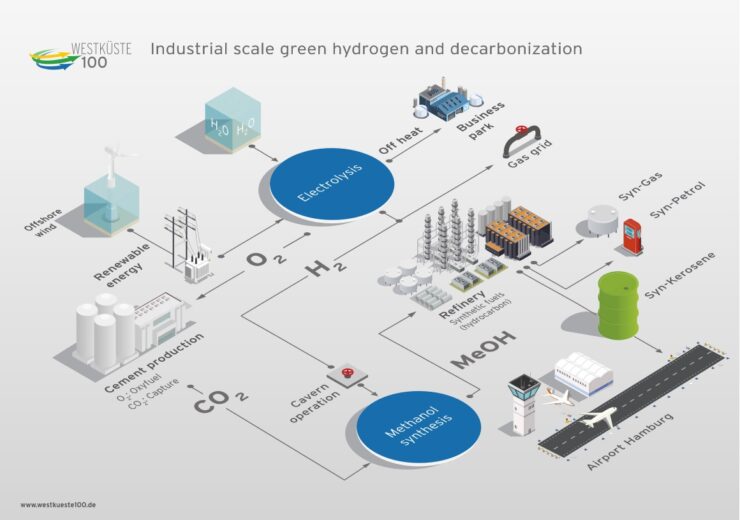The project aims to produce green hydrogen from offshore wind energy as well as use the waste heat and oxygen produced in the process

Rendering of the Westküste 100 green hydrogen project in Germany. (Credit: Westküste 100)
A consortium that includes Orsted and EDF has received approval from the German Federal Ministry of Economic Affairs and Energy for the Westkuste 100 renewable hydrogen project.
The project, which is claimed to be the country’s first of its kind, is backed €89m financing, with an approved funding of €30m from the country’s energy ministry.
In addition to EDF and Orsted, the project consortium includes Holcim Deutschland, OGE, Raffinerie Heide, Heide’s municipal utility, Thüga, and Thyssenkrupp Industrial Solutions, as well as the Region Heide development agency and the Westküste University of Applied Sciences.
The Westkuste 100 project aims to produce green hydrogen from offshore wind energy and to effectively use the waste heat and oxygen produced in the process.
The green hydrogen is planned to be used for the production of climate-friendly fuels for airplanes and fed into gas grids.
“The fuel production process will use hydrogen from electrolysis and unavoidable CO2 from regional cement production in Schleswig-Holstein for the manufacturing process,” ThyssenKrupp said.
The latest funding approval enables work to commence on the first phase of the project. It is scheduled to run for five years.
H2 Westkuste to build 30MW electrolyser
As part of the initial phase, a newly formed joint venture, H2 Westkuste, will build a 30MW electrolyser which will produce green hydrogen from offshore wind energy. It will provide information on the operation, maintenance, control and grid compatibility of the equipment.
The H2 Westkuste comprise EDF Deutschland, Orsted and Raffinerie Heide,
The project’s next stage aims to scale the electrolysis plant capacity to 700MW, powered by electricity generated by an offshore wind farm.
Raffinerie Heide managing director Jürgen Wollschläger said: “An electrolysis plant with a capacity of 700 MW – this is our vision and the next milestone in implementing the development targets laid down in the national hydrogen strategy by 2030.
“We see the energy transition as a cross-sectoral endeavour. With industry, science and politicians all pulling together, our 700 MW vision will become reality.”
